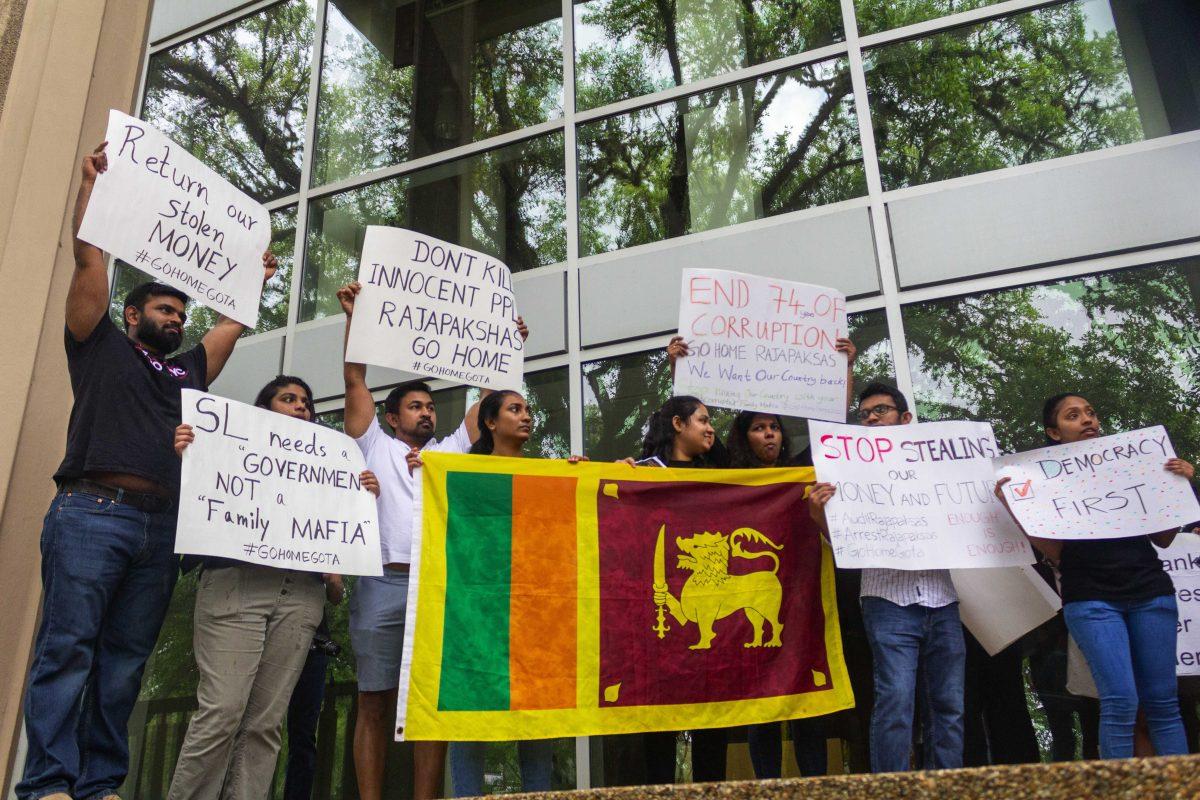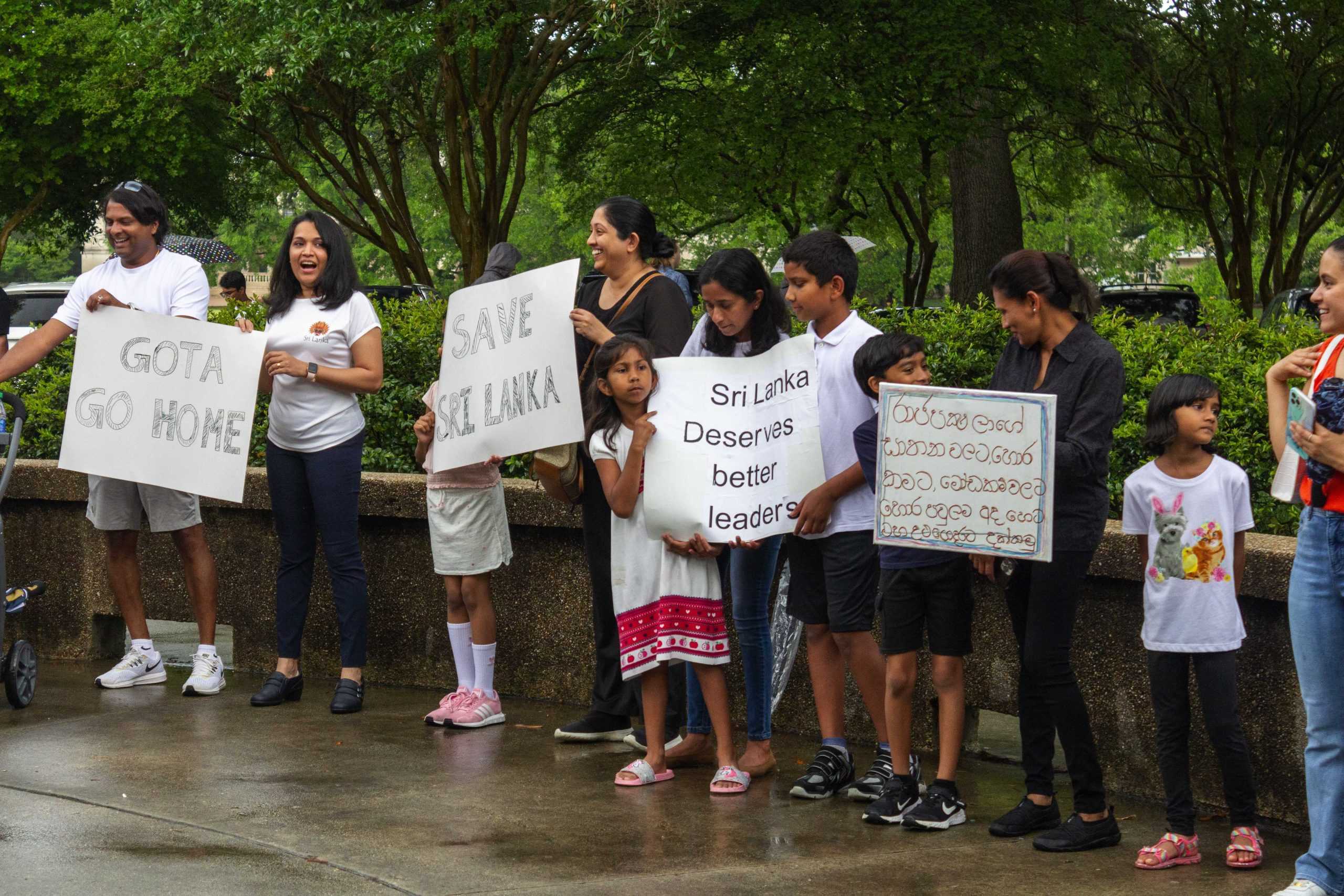A Sri Lankan LSU student arranged a peaceful protest Sunday condemning the leadership of the Sri Lankan government and raising awareness for the country’s humanitarian crisis in Free Speech Alley.
Despite the heavy rain, the protest was reinforced by students from the University of Louisiana at Lafayette and Tulane University, as well as Sri Lankans from across the state.
Ovini Kankanamge, a chemistry graduate student and vice president for the International Student Association, organized the event.
“We’re helpless and hoping that something happens to make a change, with the protests going on,” Kankanamge said. “Maybe the government resigns, and somebody takes over that can do better.”
Like many of the protesters, Kankanamge has friends and family suffering back home. She said food and medical supplies are growing scarce, the power is out as many as 16 hours a day and the market—both domestic and international—is dire.
Professor of finance and Sri Lankan native Dimuthu Ratnadiwakara believes that the majority of the problems can be traced back to the country’s long-standing leadership.
“I think it boils down to the kind of advisers the administration surrounded themselves with,” Ratnadiwakara said. “For example, the central governor wasn’t a qualified individual. The finance minister was the president’s brother. They have no clue what the long-term impacts of their decisions are.”
Sri Lanka is currently over $50 billion dollars in debt with a national reserve falling to less than $2 billion.
Ratnadiwakara said that since the 1950s, successive governments have been acting in short-sighted measures that don’t adequately handle the long-term situation.
“It’s not something that happened overnight,” Ratnadiwakara said. “It has been going on for a long time. They were not prepared to handle it. You could see in data that we’re running out of reserves. They have to renegotiate and they aren’t doing that. They don’t have a good understanding of the problem we’re facing.”
For years, the imports of Sri Lanka have outpaced the exports of the country, and the country was heavily spending more than they made.
“One of the decisions they made last year was they stopped importing a lot of fertilizer,” Ratnadiwakara said. ”Sri Lanka still depends on lots of agriculture; a lot of people’s livelihoods depend on agriculture. The people didn’t get fertilizer, so the crops didn’t grow.
“There will be a food shortage in the next couple of months as a result of that short-sighted decision.”
Ratnadiwakara said Chinese loans to Sri Lanka proved that the country was in a “debt overhang situation,” meaning that further loans couldn’t effectively be used in amending the already wide debt.
“Things that used to cost, like, 100 rupees—now they’re 300 rupees,” Ratnadiwakara said.
The price of food is becoming unreasonable, and the supply of food is diminishing. Hospitals can no longer operate on patients normally. Unrest grew to the point of protest, and the people took to social media.
Sri Lankans dissatisfied with the government’s administration used #GoHomeRajapakshas and #GoHomeGota to broadcast their message.
Kankanamge said that protesters hope that the mass response will encourage the government to renegotiate, change policy, or as the hashtags imply, prompt a resignation in favor of more qualified politicians.
“The whole country supports the situation,” Kankanamge said. “There’s a huge suspicion among the people that the leadership is corrupt. The request is that the president and prime minister resign from their positions because they don’t have any good responses. They are not doing anything to mitigate the condition.”
Briefly after the movement took to social media, the government restricted platforms. Kankanamge said that this prompted people to use virtual private networks to bypass the restrictions.
“That kind of backfired,” Ratnadiwakara said. “Initially, when the protests started, they tried to sort of send in the force of the army and ban social media. It backfired on them because it started trending internationally and they reversed the decision the next day.”
The Sri Lankan police fired live ammunition into a crowd of protesters on April 19, further isolating the government from the people.
Kankanamge said that LSU students can help by staying informed and by holding the regime accountable for their actions.
“At the moment, what the international community can do is support the International Monetary Fund,” Sam Hewage, a Sri Lankan graduate student studying math at UL, said. “If we make the international community more aware of the situation, they could help more financially.”
Hewage said that he is impressed by the concern the campus community has given the crisis in Sri Lanka.
Like many Sri Lankans abroad, he intends to join the international protest on Sunday, May 1.
Sri Lankan students protest country’s government amid economic crisis in Free Speech Alley
By John Buzbee
April 26, 2022
Protesters form up April 24, 2022 in protest against the Sri Lankan government’s treatment of their country around free speech plaza on LSU’s campus.






